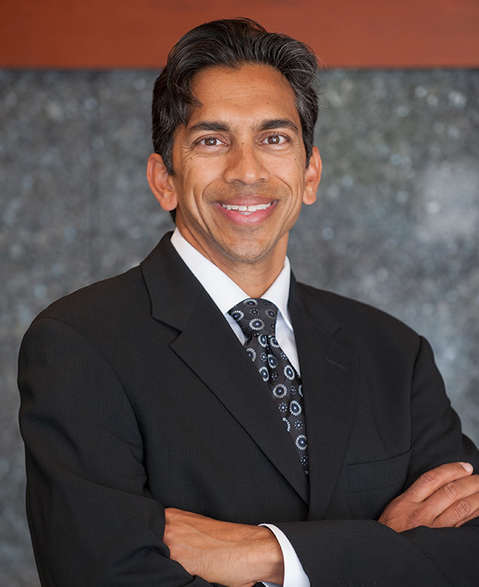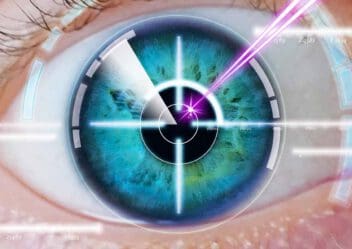
Medically Reviewed by Max Parikh, M.D. NVISION Surgeon
Cataract Surgery: Laser vs. Traditional
Home / Guide to Cataract Surgery /
Last Updated:

Medically Reviewed by Max Parikh, M.D. NVISION Surgeon
There are two main cataract surgery methods: laser-assisted and traditional. While laser surgery is often more precise and slightly safer, it might be costlier and isn’t suitable for everyone.
Table of Contents
When facing the decision to undergo cataract surgery, understanding your options is crucial. Cataracts cloud the eye’s natural lens, and to regain clarity, one can opt for either the laser-assisted or traditional surgical method. While laser surgery is lauded for its precision and safety, it can be more expensive and isn’t the go-to choice for everyone. To help streamline your decision, here’s a quick comparison of the two method:
| Laser Cataract Surgery | Traditional Cataract Surgery | |
|---|---|---|
| Precision | High | Good |
| Safety | Marginally safer | Generally safe |
| Best For | People with astigmatism and certain types of cataracts | General cataract patients |
| Cost | Higher and may not be covered by all insurance | Lower and usually covered by insurance |
Laser vs. Traditional Cataract Surgery: How Each Works
Cataracts obscure the eye’s lens, and both surgical methods aim to restore vision by replacing this clouded lens. Here’s how they differ:
Traditional Cataract Surgery
- Incision: A skilled surgeon uses a scalpel to create an incision, granting access to the lens.
- Lens Removal: An ultrasonic device dissolves and extracts the clouded lens.
- Lens Replacement: A new, clear lens is introduced through the initial incision.
You deserve clear vision. We can help.
With 135+ locations and over 2.5 million procedures performed, our board-certified eye surgeons deliver results you can trust.
Your journey to better vision starts here.
Laser-Assisted Cataract Surgery
- Mapping: An imaging device creates a detailed map of the eye, including the lens surface and interior.
- Incision: Precision lasers, not scalpels, make the incision.
- Lens Softening: Lasers can also pre-soften the cataract, which can sometimes eliminate the need for ultrasonic dissolution.
- Lens Removal & Replacement: Like traditional surgery, the clouded lens is removed, and a new one is placed.
While both methods are executed by highly trained surgeons, the core distinction lies in the tools and technology employed. Laser-assisted surgery combines cutting-edge machine learning with a surgeon’s expertise, offering a different surgical experience.
Traditional vs. Laser Cataract Surgery: Safety
Safety is a paramount concern when considering any surgical procedure, especially one involving the eyes. Let’s examine the safety profiles of both traditional and laser-assisted cataract surgeries.
Traditional Cataract Surgery:
- Well-established: This method has been in use for decades, and countless successful surgeries have showcased its safety.
- Generally Safe: When performed by an experienced surgeon, complications are rare.
Laser-Assisted Cataract Surgery:
- Precision: The laser’s pinpoint accuracy reduces potential risks, as it can make precise incisions based on a pre-surgery map of the eye.
- Enhanced Imaging: The imaging device used during laser surgery helps surgeons plan the exact size, depth, and location of the incision, further minimizing potential errors.
- Reputation for Safety: Laser-assisted surgeries have gained a reputation for their safety and reduced complications, especially when performed by well-trained surgeons.

Traditional vs. Laser Cataract Surgery: Which is Best for Specific Conditions?
Both traditional and laser-assisted cataract surgeries have their advantages. Depending on the specific condition of the patient or the characteristics of the cataract, one method might be preferred over the other.
Traditional Cataract Surgery
- General Cataracts: For standard cataract conditions without complicating factors, traditional surgery offers a reliable and effective solution.
- Cost Concerns: If budget or insurance coverage is a primary concern, traditional surgery is usually more widely covered and can be more affordable.
Laser-Assisted Cataract Surgery:
- Astigmatism: Individuals with astigmatism, where the cornea has an irregular shape, can benefit from the precision of laser surgery. It can help address vision issues stemming from the shape irregularity, which might not be fully addressed in traditional surgery.
- Advanced or Complex Cataracts: Laser surgery can be beneficial for certain types of advanced cataracts. The precision of the laser can assist in making exact incisions necessary for specific lens placements.
- Preference for Latest Technology: Those keen on leveraging the latest medical technology might opt for laser-assisted surgery. Its combination of machine learning with surgeon expertise offers a modern surgical experience.
It’s crucial for patients to consult with their ophthalmologists to determine which procedure best suits their specific needs and conditions. An individual assessment will always be the best guide to making an informed choice.
You deserve clear vision. We can help.
With 135+ locations and over 2.5 million procedures performed, our board-certified eye surgeons deliver results you can trust.
Your journey to better vision starts here.
Traditional vs. Laser Cataract Surgery: A Cost Comparison
When considering cataract surgery, understanding the cost differences between traditional and laser-assisted procedures can be essential for many patients. Both procedures offer effective solutions for cataract removal, but they come with different price tags and insurance considerations.
Traditional Cataract Surgery:
- Cost-effective: Traditional cataract surgery has been the standard for many years and, due to its widespread adoption, it tends to be more affordable.
- Insurance Coverage: Most insurance plans recognize and cover traditional cataract surgery, often requiring only standard co-pays or deductibles. Patients should, however, confirm with their specific insurance provider.
Laser-Assisted Cataract Surgery:
- Higher Initial Cost: Laser cataract surgery, being a newer and more technologically advanced procedure, usually comes with a higher price point than its traditional counterpart.
- Varied Insurance Coverage: Not all insurance plans cover laser-assisted surgery. Some might offer partial coverage, while others might not cover it at all. It’s vital for patients to check their coverage beforehand.
- Out-of-Pocket Expenses: Due to the potential lack of full insurance coverage, patients might face higher out-of-pocket expenses with laser surgery.
While laser-assisted cataract surgery can offer cutting-edge precision and benefits for certain conditions, it may come with a steeper cost. It’s always recommended for patients to have a clear discussion with their healthcare provider about all expenses and potential hidden costs, ensuring that they make an informed decision that aligns with both their medical and financial situations.
We Can Help You to Decide
At NVISION, we know you have options in terms of your health care. We also know that those options can be more than a little confusing. Let us help.
We can connect you with a skilled practitioner who can examine your eyes and explain your options to you in terms you can understand. If you choose laser surgery, we offer that technology in our office, and we can guide you through your recovery. If cost is a concern, we can discuss payment plans with you. Please contact us to talk with a surgeon in your area.
You deserve clear vision. We can help.
With 135+ locations and over 2.5 million procedures performed, our board-certified eye surgeons deliver results you can trust.
Your journey to better vision starts here.
References
- Traditional Cataract Surgery vs. Laser-Assisted Cataract Surgery. (August 2017). American Academy of Ophthalmology.
- A Review of Laser-Assisted Versus Traditional Phacoemulsification Cataract Surgery. (February 2017). Ophthalmology and Therapy.
- Initial Evaluation of a Femtosecond Laser System in Cataract Surgery. (January 2014). Journal of Cataract and Refractive Surgery.
- Comparison of Visual Recovery and Refractive Stability Between Femtosecond Laser-Assisted Cataract Surgery and Standard Phacoemulsification: Six Month Follow-Up. (July 2015). Journal of Cataract and Refractive Surgery.
- Comparing the Intraoperative Complication Rate of Femtosecond Laser-Assisted Cataract Surgery to Traditional Phacoemulsification. (February 2015). International Journal of Ophthalmology.
- Cataract Surgery: When Is the Laser Method a Good Idea? Mayo Clinic.
- Complications of Femtosecond Laser-Assisted Cataract Surgery. (January 2014). Journal of Cataract and Refractive Surgery.
- Who’s Getting Femto Laser Cataract Surgery? (March 2015). Review of Ophthalmology.

As the founding partner of the Advanced Ophthalmology Institute in 1999 and the former Los Angeles (previously San Diego) Chargers’ team ophthalmologist for over a decade, Dr. Parikh knows the value of precision and the outcomes in vision enhancement surgery.
This content is for informational purposes only. It may have been reviewed by a licensed physician, but is not intended to serve as a substitute for professional medical advice. Always consult your healthcare provider with any health concerns. For more, read our Privacy Policy and Editorial Policy.
